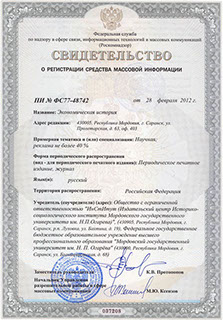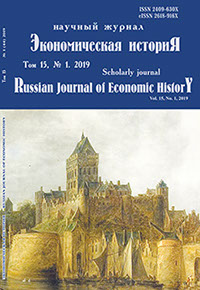Экономическая историЯ
Russian Journal of Economic History
ISSN 2409-630X (Print)
ISSN 2618-916X (Online)
Expert board:
- Scientific Council of RAS on economic history;
- Research and Educational Center «The economic history of Central Russia and the Middle Volga region» of Ogarev Mordovia State University;
- Center of Economic History of Lomonosov Moscow State University
Navigation
Certificate of registration

ISSN 2409-630X (Print), ISSN 2618-916X (Online)
DOI: 10.15507/2409-630X.044.015.201901.046-059
УДК 336.71(470.40/.43)
Roman V. Fedoseev
The Mid-Volga Institute (branch) the All-Russian State University of Justice (RLA of the Ministry of Justice of Russia) (Saransk, Russia),
e-mail: fedoseevrv@gmail.com
THE SIZE OF THE DEBT OF THE NOBLE LAND TENURE OF THE MIDDLE VOLGA REGION LAND CREDIT INSTITUTIONS IN THE LATE NINETEENTH CENTURY
Introduction. The process of establishing a system of loans secured by land ownership, which took place in the second half of the nineteenth century, was of great importance in the capitalization of agricultural production. Caught in the plight of the landed gentry lost after the reform, the ability to use free labor in the form of their serfs, was in great need in money as in order to freelance workers and to modernize their economies, to fill which just managed the joint-stock land banks. At the same time, tough credit conditions led many of them to the ruin and sale of estates, which forced the government to resort to the practice of concessional lending in the face of the state Noble land Bank. Materials and Methods. The study was carried out on the basis of a comprehensive analysis of archival data extracted from the Fund of the state Noble land Bank, which is located in the vaults of the Russian state historical archive. The solution of the research tasks required the involvement of a set of methods of historical and economic science. In the course of the research such methods as comparative-historical, systematic, quantitative, statistical, structural approach and complex analysis were used. Results. The analysis of statistical data of the Middle Volga region reflected the amount of debt of estates of hereditary nobles in the Middle Volga region to credit institutions at the end of the XIX century. It was also demonstrated the specificity of the travel indicators of land credit institutions in the provinces of the Middle Volga region. It was found that the share of the Noble Bank in the region was more than 90 % of the total number of loans issued on the security of land ownership. Discussion and Conclusions. As a result, the created system led to the fact that almost 2/3 of private land ownership was pledged by credit institutions. A significant part of the earned money was spent on the payment of interest, the possibility of timely payment of which directly depended on many indicators: the harvest, methods of management, specific conditions of the area, as well as the presence or absence of the labor market and other similar circumstances. Many landowners, unable to cope with loans, sold part or the entire estate in order to eliminate debts.
Keywords: nobles-landowners, noble land ownership, joint-stock land Bank, loan secured by land, the Middle Volga region, province, size of ownership, estate, loan.
For citation: Fedoseev R. V. The Size of the Debt of the Noble Land Ownership of the Middle Volga Region to Land Credit Institutions at the End of the XIX Century. Ekonomicheskaya istoriya = Russian Journal of Economic History. 2019; 15(1): 46–59. (In Russ.). DOI: 10.15507/2409-630X.044.015.201901.046-059.
Acknowledgements: This work was supported with financial support Russian Foundation for Basic Research in the framework of the research project № 19-09-00043.
© Ogarev Mordovia State University. History and Sociology Institute, 2017
68, Of. 411, Bolshevistskaya St., 430005, The editorial office of the scholarly journal «Russian Journal of Economic History»
Tel.: (8342) 24-25-90; 27-07-11, Fax: (8342) 24-25-90, E-mail: jurnal-econom-hist@isi.mrsu.ru
Designed by A. Napalkov, Email: napalkov@isi.mrsu.ru

